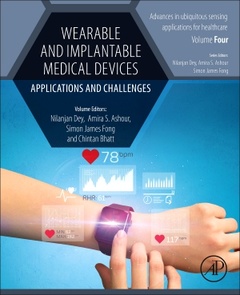Description
Wearable and Implantable Medical Devices
Applications and Challenges
Advances in ubiquitous sensing applications for healthcare Series
Coordinators: Dey Nilanjan, Ashour Amira S., James Fong Simon, Bhatt Chintan
Language: English
Subjects for Wearable and Implantable Medical Devices:
280 p. · 19x23.3 cm · Paperback
Description
/li>Contents
/li>Biography
/li>Comment
/li>
Wearable and Implantable Medical Devices: Applications and Challenges, Fourth Edition highlights the new aspects of wearable and implanted sensors technology in the healthcare sector and monitoring systems. The book's contributions include several interdisciplinary domains, such as wearable sensors, implanted sensors devices, Internet-of-Things (IoT), security, real-time medical healthcare monitoring, WIBSN design and data management, encryption, and decision-support systems. Contributions emphasize several topics, including real-world applications and the design and implementation of wearable devices. This book demonstrates that this new field has a brilliant future in applied healthcare research and in healthcare monitoring systems.
1. Internet of Things_triggered and power-efficient smart pedometer algorithm for intelligent wearable devices 2. Biosensors and Internet of Things in smart healthcare applications: challenges and opportunities 3. Wearable electroencephalography technologies for brain_computer interfacing 4. AdaptableSDA: secure data aggregation framework in wireless body area networks 5. Screening and early identification of microcalcifications in breast using texture-based ANFIS classification 6. Work environment and healthcare: a biometeorological approach based on wearables 7. Reading Assistant: a reciter in your pocket 8. Toward secure and privacy-preserving WIBSN-based health monitoring applications 9. Smart ambulance traffic management system (SATMS) - a support for wearable and implantable medical devices 10. Internet of things-linked wearable devices for managing food safety in the healthcare sector
Nilanjan Dey is an Associate Professor in the Department of Computer Science and Engineering, Techno International New Town, Kolkata, India. He is a visiting fellow of the University of Reading, UK. He also holds a position of Adjunct Professor at Ton Duc Thang University, Ho Chi Minh City, Vietnam. Previously, he held an honorary position of Visiting Scientist at Global Biomedical Technologies Inc., CA, USA (2012–2015). He was awarded his PhD from Jadavpur University in 2015. He is the Editor-in-Chief of the International Journal of Ambient Computing and Intelligence , IGI Global, USA. He is the Series Co-Editor of Springer Tracts in Nature-Inspired Computing (SpringerNature), Data-Intensive Research(SpringerNature), Advances in Ubiquitous Sensing Applications for Healthcare (Elsevier). He was an associate editor of IET Image Processing and editorial board member of Complex & Intelligent Systems, Springer Nature. He is an editorial board member of Applied Soft Computing, Elsevier. He is having 35 authored books and over 300 publications in the area of medical imaging, machine learning, computer aided diagnosis, data mining, etc. He is the Fellow of IETE and Senior member of IEEE.
Amira S. Ashour is an Assistant Professor and Head of Electronics and Electrical Communications Engineering Department, Faculty of Engineering, Tanta University, Egypt. She is a member in the Research and Development Unit, Faculty of Engineering, Tanta University, Egypt. She received the B.Eng. degree in Electrical Engineering from Faculty of Engineering, Tanta University, Egypt in 1997, M.Sc. in Image Processing in 2001 and Ph.D. in Smart Antenna in 2005 from Faculty of Engineering, Tanta University, Egypt. Ashour has been the Vice Chair of Computer Engineering Department, Computers and Information Technology College, Taif University, KSA for one year from 2015. She has been the vice chair of CS department, CIT college, Taif University, KSA for 5 years. Her research interests a
- Includes comprehensive information on wearable and implanted device technology, wearable and implanted sensors design, WIBSN requirements, WIBSN in monitoring systems and security concepts
- Highlights machine learning and computing in healthcare monitoring systems based on WIBSN
- Includes a multidisciplinary approach to different healthcare applications and their associated challenges based on wearable and implanted technologies




